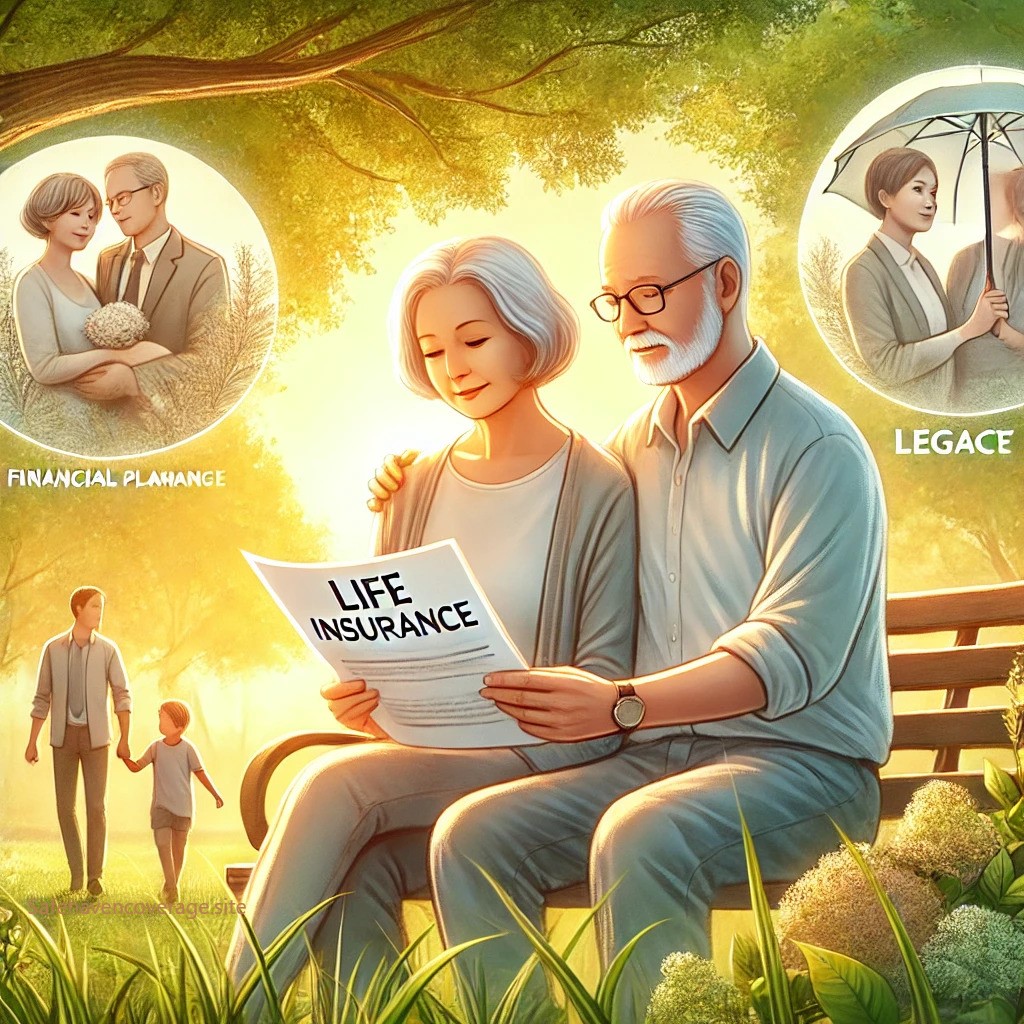Life Insurance Options for Those Over 60: A Complete Guide [2025]
Life Insurance Options for Those Over 60
As you age, your priorities shift, and securing financial stability for your loved ones becomes more important. For individuals over 60, life insurance options are still available, but they may differ from those offered to younger individuals. Whether you’re looking to cover final expenses, leave a legacy, or ensure your family’s financial security, it’s crucial to understand the available life insurance options. This comprehensive guide explores the various life insurance policies available for people over 60, helping you make an informed decision.

Why Life Insurance Matters for Those Over 60
Life insurance is essential at any age, but for individuals over 60, it serves different purposes than when you were younger. Many people in this age group may no longer have dependents relying on them for support, but there are still reasons to maintain life insurance options coverage. Here are some key reasons why life insurance is important for those over 60:
- Cover Final Expenses:
One of the most common reasons older adults purchase life insurance is to cover final expenses, such as funeral costs, medical bills, and outstanding debts. - Leave a Financial Legacy:
Life insurance can be a means to leave a financial gift to family members, charities, or loved ones. - Pay for estate taxes:
If you have significant assets, life insurance can help your beneficiaries cover any estate taxes that may be due upon your death. - Pay off Debts:
Life insurance can also be used to ensure that remaining debts, such as credit card balances or loans, don’t burden your loved ones. - Provide for a Spouse or Partner:
If you have a spouse who relies on you financially, life insurance can help ensure their financial security after you’re gone.
Types of Life Insurance for People Over 60
When shopping for life insurance over 60, there are a variety of policies to choose from, each with its pros and cons. The right policy for you will depend on your health, financial situation, and goals. Below are the most common life insurance options for those over 60.
Term Life Insurance
Term life insurance provides coverage for a set period, typically 10, 20, or 30 years. It’s often the most affordable option for people over 60, especially if they’re in good health. If you pass away during the term, the policy pays a death benefit to your beneficiaries.
Pros of Term Life Insurance for Over 60s:
- Affordable Premiums: Term life is typically less expensive than other forms of life insurance.
- Simplicity: The policy is straightforward, with a clear death benefit and term duration.
- Flexibility: You can choose the length of the term based on your financial needs.
Cons of Term Life Insurance for Over 60s:
- Coverage Expires: Once the term is over, the policy expires, and you’ll need to apply for new coverage if you still need it.
- Premiums Increase with Age: If you apply for a new term life policy later in life, premiums can be significantly higher due to your age.
Whole Life Insurance
Whole life insurance is a form of permanent life insurance that provides coverage for your entire life, as long as premiums are paid. It also accumulates cash value over time, which you can borrow against or use for other financial needs.
Pros of Whole Life Insurance for Over 60s:
- Lifelong Coverage: Whole life insurance ensures that your beneficiaries will receive a death benefit whenever you pass away, as long as premiums are maintained.
- Cash Value Growth: A portion of your premiums goes toward building cash value, which grows over time.
- Fixed Premiums: The premiums remain the same for life, which can be beneficial for budgeting.
Cons of Whole Life Insurance for Over 60s:
- Higher Premiums: Whole life insurance tends to be more expensive than term life insurance.
- Complexity: There are various factors to consider, such as cash value growth, dividends, and loan options.
Guaranteed Issue Life Insurance
For individuals over 60 who may not be able to qualify for other types of life insurance due to health issues, guaranteed issue life insurance can be an attractive option. This policy is available without a medical exam or health questions.
Pros of Guaranteed Issue Life Insurance:
- No Medical Exam Required: This makes it an ideal option for seniors with health conditions.
- Guaranteed Acceptance: As long as you meet the age requirements, you are guaranteed coverage.
Cons of Guaranteed Issue Life Insurance:
- Limited Coverage: The death benefit is often lower compared to other life insurance policies, usually ranging from $5,000 to $25,000.
- Higher Premiums: Because the policy doesn’t require medical underwriting, premiums tend to be higher.
- Waiting Period: Many policies have a waiting period of 2-3 years before the full death benefit is payable, meaning your beneficiaries may not receive the full payout if you pass away within the first few years of the policy.
Final Expense Insurance
Final expense insurance, also known as burial insurance, is designed specifically to cover end-of-life expenses like funeral costs, medical bills, and other final expenses. It’s typically a form of whole life insurance but with smaller death benefits and simplified underwriting.
Pros of Final Expense Insurance:
- Affordable: Premiums are generally lower compared to larger whole-life policies.
- Simplified Application Process: The application process is quick and easy, with no medical exams or lengthy questionnaires.
- Designed for Seniors: The death benefit is specifically intended to cover funeral and burial costs.
Cons of Final Expense Insurance:
- Low Coverage: Coverage amounts typically range from $2,000 to $50,000, which may not be enough for larger financial needs.
- Not Ideal for Large Debts: If you have significant debts or want to leave a larger legacy, final expense insurance may not provide enough coverage.
Universal Life Insurance
Universal life insurance is a type of permanent life insurance that offers flexibility in premium payments and death benefits. A portion of your premium goes toward building cash value, which can be used to cover premiums in the future or grow over time.
Pros of Universal Life Insurance for Over 60s:
- Flexible Premiums: You can adjust your premium payments and death benefit over time.
- Cash Value Growth: Like whole life insurance, universal life insurance accumulates cash value.
- Lifelong Coverage: It offers permanent coverage, as long as premiums are paid.
Cons of Universal Life Insurance for Over 60s:
- Higher Premiums: Premiums tend to be higher than term life insurance and final expense insurance.
- Complexity: The policy can be more complex due to the investment component, and you must monitor the cash value growth.
How to Choose the Right Policy?
When selecting a life insurance policy at 60 or older, consider the following factors:
- Your Financial Goals:
Do you want to cover final expenses, leave a financial legacy, or provide for your spouse? Your financial goals will determine which type of life insurance is best suited to your needs. - Your Health:
Health plays a significant role in determining the cost of life insurance. If you’re in good health, you may qualify for lower premiums on policies like term life insurance or whole life insurance. - Your Budget:
Consider how much you can afford in premiums. Permanent life insurance policies like whole life and universal life tend to have higher premiums than term life insurance. - The coverage amount you need:
Evaluate your needs carefully. If you only need coverage for final expenses, a smaller policy like final expense insurance may be sufficient. However, if you want to leave a larger legacy, a whole or universal life policy might be better.
Conclusion
As you approach or enter your 60s, life insurance remains a valuable tool to protect your family’s financial future. There are several options available, each designed to meet different needs and budgets. Whether you’re looking for affordable term life insurance to cover your mortgage or a permanent policy to leave a legacy, understanding your choices will ensure you make an informed decision. Work with a trusted insurance advisor to assess your financial situation and select the policy that best aligns with your goals and priorities. By planning, you can enjoy peace of mind knowing your loved ones will be financially protected after you’re gone.
Explore More
Visit our website, Safehavecoverage, to learn more. Click here to learn about Universal Life Insurance.

One thought on “Life Insurance Options for Those Over 60: A Complete Guide [2025]”